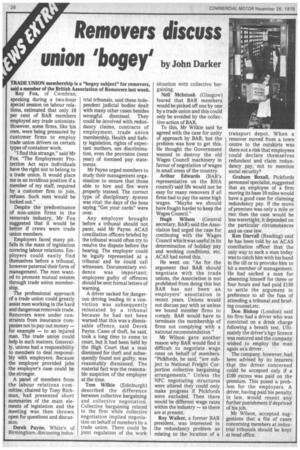Removers discuss
Page 28

Page 29

If you've noticed an error in this article please click here to report it so we can fix it.
union 'bogey' by John Darker TRADE UNION membership is a "bogey subject" for removers, said a member of the British Association of Removers last week.
Roy Fox, of Cwmbran, speaking during a two-hour special session on labour relations, estimated that only 10 per cent of BAR members employed any trade unionists. However, some firms, like his own, were being pressured by customer firms to employ trade union drivers on certain types of container work.
"I find this strange," said Mr Fox. "The Employment Protection Act says individuals have the right not to belong to a trade union. It would place me in an invidious position if a member of my staff, required by a customer firm to join, refuses. Such men would be locked out."
Despite the predominance of non-union firms in the removals industry, Mr Fox suggested that it would be better if crews were trade union members.
Employers faced many pitfalls in the mass of legislation covering labour relations. Employers could easily find themselves before a tribunal, however paternal their form of management. The men wanted to promote mutual esteem through trade union membership.
The professional approach of a trade union could greatly assist men working in the hard and dangerous removals trade. Removers were under constraints from insurance companies not to pay out money — for example — to an injured man. The trade union could help in such matters. Generally, unions had a responsibility to members to deal responsibly with employers. Because the employer provided jobs the employer's case could be the stronger.
A panel of members from the labour relations committee, chaired by Tony Richman, had presented short summaries of the main elements of legislation and the meeting was then thrown open for questions and discussion.
Derek Payne, White's of Birmingham, discussing indus trial tribunals, said these independent judicial bodies dealt with many other cases besides wrongful dismissal. They could be involved with redundancy claims, contracts of employment, trade union membership, Health and Safety legislation, rights of expectant mothers, sex discrimination, even the provision (next year) of itemised pay statements.
Mr Payne urged members to study their management organisation to ensure that those able to hire and fire were properly trained. The correct type of disciplinary system was vital: the days of the boss saying "Get your cards" were over.
Any employer brought before a tribunal should not panic, said Mr Payne. ACAS conciliation officers briefed by the tribunal would often try to resulve the dispute before the hearing. The employer could be legally represented at a tribunal and he could call witnesses. Documentary evidence was important; employees guilty of offences should be sent formal letters of warning.
A driver sacked for dangerous driving leading to a conviction was subsequently reinstated by a tribunal because he had not been warned that this was a dismissable offence, said Derek Payne. Cases of theft, he said, took a long time to come to court, but it had been held by the High Court that a man dismissed for theft and subsequently found not guilty, was reasonably dismissed. The material fact was the reasonable suspicion of the employer at the time.
Tom Wilkie (Edinburgh) described the difference between collective bargaining and collective negotiation. Collective bargaining related to the firm while collective negotiation implied negotiation on behalf of members by a trade union. There could be joint regulation of the work situation with collective bargaining.
Neil McIntosh (Glasgow) feared that BAR members would be picked off one by one by a trade union and this could only be avoided by the collective action of BAR.
To this, Mr Wilkie said he agreed with the case for unity of approach by BAR, but the problem was how to get this. He thought the Government wanted to destroy the old Wages Council machinery in favour of negotiation of wages in small areas of the country.
Arthur Edwards (BAR's representative on the RHA council) said life would not be easy for many removers if all firms had to pay the same high wages. "Maybe we should have fought harder to keep the Wages Council."
Hugh Wilson (General secretary, BAR) said the Association had urged the case for continuing with the Wages Council which-was useful in its determination of holiday pay and working conditions, etc. ACAS had noted this.
He went on: "As for the argument that BAR should negotiate with the trade unions, the Association is not prohibited from doing this but BAR has not been an employers' association in recent years. Unions would not discuss pay with us unless we bound member firms to comply. BAR would have to terminate the membership of firms not complying with a national recommendation."
Mr Wilson gave another reason why BAR would find it difficult to negotiate wage rates on behalf of members. "Pickfords, he said, "are subject to National Freight Carportion collective bargaining arrangements." Unless the NFC negotiating structures were altered they could only make progress if Pickfords were excluded. Then there would be different wage rates within the industry — as there are at present.
Roy Walker, a former BAR president, was interested in the redundancy problem as relating to the location of a transport depot. When a remover moved from a town centre to the outskirts was there not a risk that employees could declare themselves redundant and claim redundancy pay, not to mention social security?
Graham Boxall, Pickfords personnel specialist, suggested that an employee of a firm moving its base 10 miles would have a good case for claiming redundancy pay. If the move of premises was only a mile or two then the case would be less watertight; it depended on the particular circumstances and on case law.
Ken Darvall (Reading) said he has been told by an ACAS conciliation officer that the only way to sack a man today was to catch him with his hand in the till or to provoke him to hit a member of management. He had sacked a man for absenting himself for three or four hours and had paid £150 to settle the argument in preference to all the fuss of attending a tribunal and briefing counsel,etc.
Don Bishop (London) said his firm had a driver who was convicted on a drink charge following a breath test. Ultimately the driver's hgv licence was restored and the company wished to employ the man again as a driver.
The company, however, had been advised by its insurers t4t the driver concerned could be accepted only if a £100 excess was paid on the premium. This posed a problem for the employers. A driver, having paid his penalty in law, would resent any further punishment if deprived of his job.
Mr Wilson, accepted suggestions that a file of cases concerning members at industrial tribunals should be kept at head office.
John Fr/swell is a Director of Redcliffe Roadways Ltd the Sutton-inAshfield based transport company. With 50-plus Reefer runs to the Middle East every month, they are probably Europe's largest operator to that area. Of the 80 trailers in the Redcliffe fleet, 30 are on rental from Rentco. Redcliffe rely on Rentco reliability. But listen to Mr. Fr/swell...
,"I've been using Rentco for several years now, and have established a really good working relationship with their local depot manager. Nothing is too much trouble for him — seven days a week. That, together with the fact that Rentco offer good equipment at competitive prices, is the main reason I always turn to Rentco first. Even though we are working at full stretch virtually all the time, with Reefers costing what they do to buy, it still suits us better to rent them. In fact I've just approached Rentco for 20 to service a £21/4 million contract for Saudi Arabia.
Our vehicles take a real hammering, and only the best is good enough. Rentco trailers are Crane Fruehauf built, need one say more? Another thing is damage recharge. When a trailer gets back slightly 'modified' Rentco are always fair. We trust them — and they trust us." In today's world of financial uncertainty, more and more general hauliers are realising that trailer rental and contract hire make good sense — and more and more are choosing Rentco. Just look what Rentco has to offer, and then fill in the coupon to find out how Rentco can help you.
• Dependable service 0 Nationwide coverage • All types of semi-trailers available • All Crane Fruehauf semi-trailers • No 'hidden' extras • Complete flexibility • Your own livery on Contract Hire • Special short-term rental rates for Contract Hire customers • Competitive rates








































































































